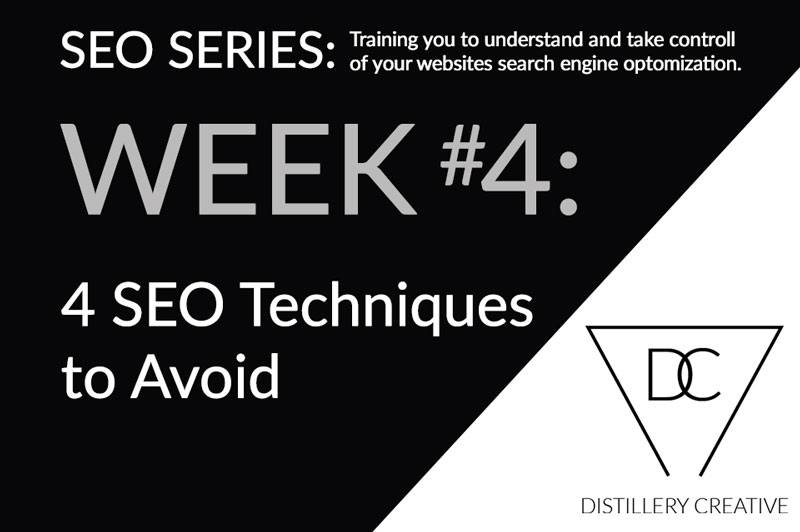
4 SEO Techniques to Avoid
We concluded our last post by talking about the long-term investment mindset that SEO requires. It can take months of dedicated effort to see significant improvement in your ranking. So you may be tempted to think, “Is there any way to speed up the process?”
Some SEO consultants offer guarantees like “I will make you #1 on Google in less than a month” or “I can instantly quadruple your traffic from search engines.” While these guarantees sound appealing, you should run far, far away from anyone who tells you anything like this.
These companies employ tactics known as “grey hat” or “black hat” SEO. Grey hat SEO uses techniques to try to trick search engines’ algorithms into giving sites higher rankings. Google, however, is always improving the sophistication of their algorithm to crack down on these techniques and punish sites who use them with lower rankings.
Black hat SEO is much more insidious. It is the category of strictly unethical practices, such as spam commenting, paying for backlinks, using bots to increase page views, etc. If Google catches your site using black hat techniques, they will not only penalize you with lower page rankings, but they may also ban your site completely from all results pages.
The bottom line is that companies who use underhanded SEO techniques will give you short term gains, but you will be much worse off in the long run. It takes a lot more work to recover from the search engines blacklist than it takes to just do it the right way from the beginning.
So, how can you make sure you’re not hiring a company that uses grey hat or black hat tactics? Keep an eye out for suggestions like the following:
1. Keyword stuffing
Keyword stuffing is one of the most common methods of grey hat techniques. It involves placing the keywords with which you want to rank in as many places as possible. These include places like the title of your page, the footer of your website, the meta data hidden in the code of your website, and even awkwardly placing the words in the content of your site. We’ll talk more about keyword stuffing content in our next post.
2. “Spam” commenting
If your SEO consultant recommends commenting on all articles and blogs related to your industry with a canned response, run the other direction. This is known as spam commenting and considered a black hat technique.
3. Paid backlinks
Links to your site from other sites (also called backlinks) are an excellent way to increase your domain authority, or trustworthiness, in the eyes of search engines. However, you want avoid anyone who offers to build up your link network for a price. Because they value organically grown authority, search engines consider paid links an unethical method for building site authority. Search engines, therefore, reward sites that naturally gain authority and punish those who try to pay their way to the top.
4. Pre-optimized sites and fake directories
Pre-optimized pages and fake directories are two popular grey hat SEO techniques. Some companies will create landing pages that are pre-optimized for certain keywords. For instance, an SEO company might create a page for the keywords “Chicago pizza restaurant,” and optimize the site to rank high on search engines. When they sign on a client who runs a pizzeria in Chicago, they will redirect their client’s site to that pre-optimized site and boom: instant high rankings. Fake directories are a similar tactic in which the company links multiple pages from their client’s site in a directory stuffed with keywords.
This isn’t strictly unethical from an SEO perspective, but it is unwise. The client’s site is never actually optimized for search engines. Any ranking the client gains is dependent upon the SEO company. If that client ever wants to end that company’s services, they will be left with nothing and will have to start from scratch to build their ranking organically. The work your SEO consultant performs should never rely upon an outside source for its sustainability.
It may be counterintuitive, but the best SEO companies are the ones who don’t offer guarantees. Why? Because no one can control the actual outcome of SEO. You want to look for a consultant who doesn’t promise to deliver what they can’t control. If they make guarantees, it usually means they are using underhanded techniques to try to manipulate something out of their control.
Look for a consultant who works hard. It may take a while to see the results, but ethical, dedicated SEO consultants are worth their weight in gold.
If you have any questions, we’d love to hear from you! Leave a comment below, or send us an email.


